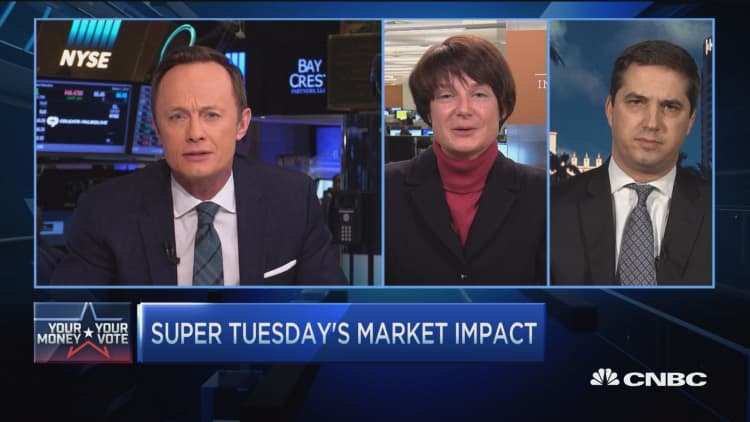
A Donald Trump presidency would produce higher deficits and interest rates, and raises some specific concerns for internationally-focused investors, Dan Clifton, head of U.S. policy research for Strategas Research Partners, said Tuesday.
But a Trump White House could also secure tax reforms investors generally support, he said.
The Republican front-runner heads into Super Tuesday contests with three consecutive primary and caucus wins under his belt and a sizable lead in many states, according to various polls.
Republican candidates favor fiscal policy fixes like corporate tax reform rather than continued reliance on monetary policy, such as keeping interest rates low, Clifton said.
"Much of that corporate tax reform proposal would be rewarded by the equity markets if they were able to get them through," he told CNBC's "Squawk on the Street."
Trump's corporate tax reform policy is in line with supply-side economics typically favored by Republicans, and would be welcomed by Wall Street, he said. But increased spending on defense, cybersecurity, and homeland security under Trump could create funding shortfalls, he added.
"You're going to see higher deficits as a result of that, and you'll likely see higher interest rates, all else being equal, if the Trump plan was able to get through Congress," Clifton said.
Investors are concerned Trump would be a protectionist president and would launch a trade war with China, he added. Trump has said he would threaten China with a 45 percent tariff in negotiations.
While those fears are overdone, the United States would be unlikely to expand free trade deals under Trump, Clifton said.
"That hurts U.S. multinational companies relative to other countries," he said. "Small cap stocks would probably do better that have more of a domestic focus under a Trump presidency."
To be sure, former Secretary of State Hillary Clinton, like Trump, has criticized President Barack Obama's signature trade deal, the Trans-Pacific Partnership, Clifton noted.
Clinton is looking to advance her lead in Tuesday's contests after beating Vermont Sen. Bernie Sanders badly in the Democratic South Carolina primary on Saturday.
Clifton said he sees a Clinton presidency as a continuation of Obama's leadership, which would leave monetary policy as the primary lever for economic growth. Investors should expect slightly more spending and higher taxes under Clinton, he said.
Clinton has proposed a 4-percent surtax on income over $5 million, a rate increase for some capital gains, and a higher top estate tax rate. She has vowed to provide tax relief for working families.
The higher taxes on the wealthy would create "fiscal drag," Clifton told CNBC.
Pharmaceutical stocks could suffer under either Trump or Clinton because both support allowing the government to negotiate on Medicare drug prices, Clifton said. That could crimp pharma firms' profits.
— CNBC's Kori Hale contributed reporting to this story.





